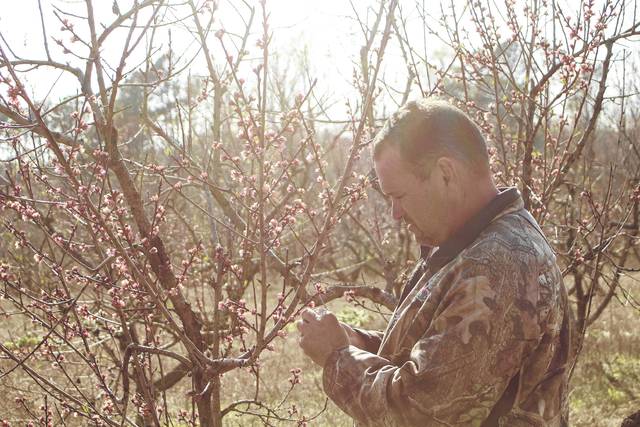ELLERBE — Farmers across the region are concerned about possible crop damage from this week’s deep freeze — and peach orchards seem to have been hardest hit.
Lee Berry said he isn’t as concerned about his strawberry crops.
“I think that we’re going to be OK,” he predicted Thursday afternoon. “Tonight’s still another test on the crops, because it’s going to be 23 or 24 degrees. I saw 18 this morning.”
Paige Burns of the Richmond County Cooperative Extension Office said there are precautions taken during cold snaps to keep early crops from withering in winter’s chill.
“There are different things farmers can do depending on what crops they grow,” Burns explained. “With strawberries, they have row covers which are like blankets.”
Berry said two row covers are enough for temperatures as low as 22 degrees.
“We used three row covers, just for a little insurance,” he explained. “I feel like three should be sufficient. We’re going to pull all the covers off tomorrow and take a look.”
March has brought several sleepless nights for farmers, Berry said, and there could still be 20 to 25 days capable of bringing bitter temperatures this way.
“I actually bought a peach orchard in Ellerbe, and it’s a total loss,” he said. “Other peach farmers around here say they’re looking at a 90 to 95 percent loss. One of the largest peach growers in the area, down in Macbee, South Carolina, took a big hit last night and he’s got 1,000 acres.”
For strawberries, laying the row covers is an added expense, Berry explained.
“And with the peaches, you’ve got so much invested in pruning them and spraying them — and you’re not going to get a harvest,” he said.
He said the hours of good, direct sunlight Thursday will help build radiant heat that can further protect his strawberries tonight.
“We’ve got cabbage, broccoli and kale that got burnt by the wind,” Berry said. “It’s too soon to tell how much it affected them. We have potatoes planted but they haven’t broken ground yet so they’re safe. But peaches and strawberries will be pricier this year. The price of peaches will really be affected.”
Burns said people often misunderstand one method farmers use to preserve their crops in cold weather. Overhead irrigation, which involves using sprinklers to protect plants from late-season freezes, is confusing to many people.
“The recent event that we had, the wind was so, so strong that you couldn’t really use overhead irrigation,” she explained. “People have the idea that you are sprinkling to put ice on the top of the plants and that the ice is insulating the flower — that is not what is happening.
“When you put freezing water over a plant, you have to be consistent and water is constantly applied at a very consistent rate until temperatures rise above freezing,” Burns continued. “That phase change in the moment it goes from water to ice releases a molecule that keeps the water at 32 degrees.”
Burns said it works well for some types of crops, and not so well with others.
“Several people are using it with blueberries,” she said. “That can cause, and has caused, breakage. Theoretically, you could do that with peaches — but it’s hard to get the consistency over acres of orchard.”
For peaches, Burns said there are different techniques.
“Some folks have wind machines that move some of the warmer, upper air with the colder air below to keep it from freezing,” she explained. “The weather we had this week made that less effective because it was so windy and cold for so many days. It has been a really, really hard year and things started early. If we had not had those warm spells that got everything going so much earlier, this might not have happened.”
This summer when traveling on highways in the Carolinas, Burns said she encourages people to do what they can to support the local farmers.
“I hope people will remember all the hardships our farmers go through,” she said. “We can support our farmers by buying their crops. Even if strawberries are a little higher this year, we should think of the sacrifice it took for the farmers to grow those. And if any peaches survive this year, let’s buy them and be grateful for what it took to get them to us.”
Reach reporter Melonie McLaurin at 910-817-2673.

